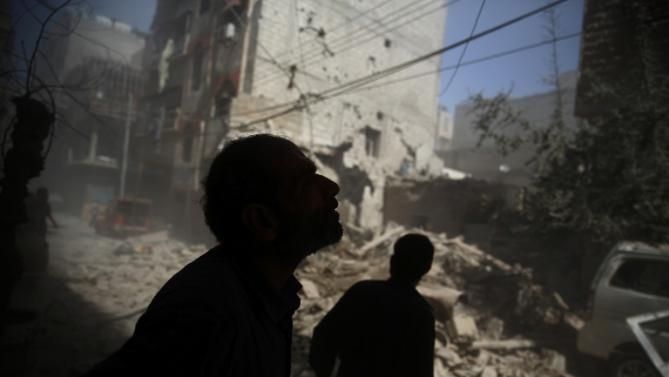ANALYSIS: Divided over Assad, Arab states remain silent on Russian airstrikes

Divided over the fate of President Bashar al-Assad, Arab countries have kept silent over Russian airstrikes in Syria - apart from Cairo, which openly supports Moscow's campaign, experts say.
"The Arab world has lacked regional leadership for years from within the region, and in that void, the US and Russia have been engaging," said HA Hellyer, Middle East policy expert at the Washington-based Brookings Center.
"There are some signs that some wish to change that from within the region, but the first example of leadership is being shown in the multilateral Arab intervention into the Yemen [conflict] - and it is not a promising example at all," he said, referring to a Saudi-led coalition against Shiite rebels thought to be backed by Iran, a regional heavyweight.
Moscow launched airstrikes on Syria last week, but has come under fire for raids on Western-backed moderate opponents of Assad rather than what it says are targets connected to militants of the Islamic State [IS] group.
US President Barack Obama has severely criticised Russia, saying its military campaign is only strengthening IS.
But Arab countries including Saudi Arabia and Qatar, members of a US-led coalition that has been carrying out strikes on IS since last year, have so far refrained from making any statements other than one jointly issued by the US-led alliance urging Moscow to "immediately" halt the campaign and "focus" only on IS.
Divergent views
Just hours before Moscow unleashed its bombing campaign last Wednesday, Saudi Foreign Minister Adel al-Jubeir insisted that "there is no place for Assad in the future of Syria".
But not all Arab governments are against Russia's intervention in Syria.
Egypt, the world's biggest Sunni Arab country and which boasts the region's largest and best-equipped military, welcomed the Russian campaign as a measure to fight militant groups like IS.
"We believe that the ([Russian intervention] will impact the fight against terrorism in Syria and help eliminate it," Egyptian Foreign Minister Sameh Shukri said in New York on Saturday.
Relations between Cairo and Moscow have flourished in recent times, with President Abdel Fattah al-Sisi warming up to Russia after Egypt's ties with traditional ally Washington became strained following the overthrow of president Mohamed Morsi in 2013 by then army chief Sisi.
A government crackdown targeting Morsi supporters that has left hundreds dead and tens of thousands jailed caused deep resentment in Washington, although this has waned in recent months.
"Russia is concerned by the resistance to terrorism, and the purpose of its intervention is a fatal blow to terrorism in Syria. Its strikes are in line with those of the anti-Daesh coalition in Syria and Iraq" led by Washington, Shukri said, using the Arabic acronym for IS.
The Arab world's silence is to be expected, and reflects its division over how to proceed in Syria, experts say.
"Cairo has been gradually embracing Moscow's view on Syria, which is diametrically different from Riyadh's," said Hellyer.
"For the Saudis, the main strategic objective remains the fall of Assad's regime - a goal irreconcilable with Russian interests," said Karim Bitar, Arab affairs specialist at the Paris-based Institute of International and Strategic Relations.
In contrast, "Egypt's Sisi is more in line with (Russian President Vladimir) Putin's policy that seeks to revive the camp of authoritarian nationalism in the face of Islamist movements."
Even if Saudi Arabia wants the fall of the Damascus government it has a "confusing" foreign policy, as is evident from its intervention in Yemen, said Yezid Sayegh, Syria expert at the Carnegie Middle East Center.
"It does not know what to do or how to do it. The Saudis have reached a limit" when it comes to Syria, he said.
Stay informed with MEE's newsletters
Sign up to get the latest alerts, insights and analysis, starting with Turkey Unpacked
Middle East Eye delivers independent and unrivalled coverage and analysis of the Middle East, North Africa and beyond. To learn more about republishing this content and the associated fees, please fill out this form. More about MEE can be found here.




